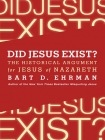Did Jesus Exist? - The Historical Argument for Jesus of Nazareth by Bart Ehrman (ebook reader browser .TXT) 📗

- Author: Bart Ehrman
Book online «Did Jesus Exist? - The Historical Argument for Jesus of Nazareth by Bart Ehrman (ebook reader browser .TXT) 📗». Author Bart Ehrman
Or take a second story, Jesus healing the paralytic in Mark 2, which Price says is based on an episode in 2 Kings 1:2–17, Elijah healing King Ahaziah. Really? Simply read the stories for yourself. The differences are so pronounced that it is hard to see one as the source for the other.
The overarching problem is this: Price, as we saw earlier, was correct in stressing that historians deal not with certainties but only with probabilities. But he seems to have jettisoned this view when actually making historical judgments. In his view, virtually any story about Jesus with the remotest tie to a text of the Old Testament is written off as a midrash. But where are the probability judgments? To illustrate the problem, consider two stories, one that can plausibly be thought to have been made up to provide a parallel to a text in the Old Testament, and the other not.
The story of Jesus’s triumphal entry into Jerusalem has long been recognized by scholars as historically problematic. It is told in an especially interesting way in Matthew’s version (Matthew 21:1–11). Near the end of his life Jesus decides to make his fateful trip to Jerusalem; he instructs his disciples to find a donkey so that he can ride into town. In fact, in Matthew, the disciples are instructed to find two animals, a donkey and its colt. They bring the animals to Jesus, and he straddles the two and rides into Jerusalem to the acclamation of the crowds, who spread cloaks and branches on the road before him, shouting, “Hosanna to the son of David! Blessed is the one who comes in the name of the Lord!” We are told that this extraordinary entrance scene was to fulfill a prophecy of scripture: “Look, your king is coming to you, humble, and mounted on a donkey, and on a colt, the foal of a donkey,” a quotation from the Old Testament prophet Zechariah (9:9).
In the other Gospels, when Jesus rides into town it is only on one animal, a donkey. Matthew has read the prophecy in Zechariah in an overly literalistic way, not realizing the poetic character of the passage. In the Hebrew Bible, poetry is written in sense lines, in which the statement of the first line either is contrasted with a statement in the second line or, instead, is restated in the second line in different words. Zechariah described the arrival of the holy one in two different ways in the two lines: he would come on a donkey, and on a colt, the foal of a donkey. This is a standard form of Hebrew poetry. But Matthew read the passage literally, thinking that Zechariah was imagining two different animals (a donkey and a colt), and so when he wanted Jesus to fulfill this prophecy, he had him straddling the two animals, a rather uncomfortable and somewhat undignified entrance into the city, one might think.
This entire scene is built around the fulfillment of a prophecy, which may make it historically suspect. But there are other reasons for doubting that it happened the way Matthew describes it. If it is true that the crowds were shouting that Jesus was the messiah now arriving in the holy city, why didn’t the authorities immediately take notice and have him arrested both for causing a disturbance and for claiming to be the Jewish king (when only Rome could appoint the king)? Instead, according to Matthew and the other Gospels, Jesus spent an unmolested week in Jerusalem and only then was arrested and put on trial. But it defies belief that the Roman authorities who were in town precisely in order to prevent any mob actions or uprisings would have failed to intervene if the crowds shouted in acclamation for a new ruler arriving in town.
Jesus almost certainly came to Jerusalem, as we will see later, but not like this. The story has been made up (or adopted) in order to show that he fulfilled the prophecy of Zechariah.
Take now a second instance where the heart of the story—as I will argue in a later chapter—is almost certainly historical despite the literary embellishments around it. At the beginning of Jesus’s ministry he is said to have been baptized by John the Baptist. The accounts in the Gospels are clearly amplified beyond historical plausibility: in the earliest version, Mark’s, when Jesus comes out of the water, the heavens are said to rip apart, the Holy Spirit is said to descend upon him as a dove, and a voice comes from heaven: “You are my beloved son in whom I am well pleased” (Mark 1:9–11). The scene, as narrated, is designed to show that here, at the beginning of his ministry, Jesus is acknowledged by God as his unique son and anointed by the Holy Spirit from





Comments (0)